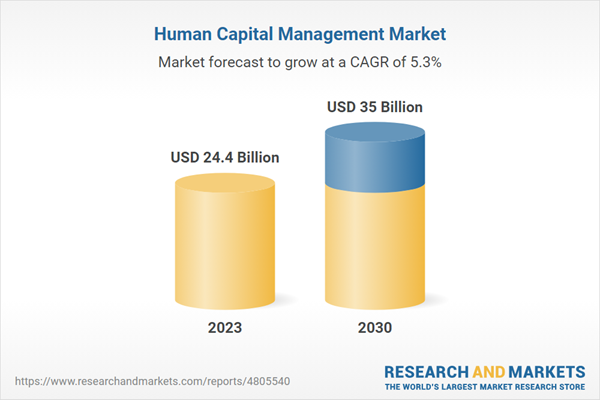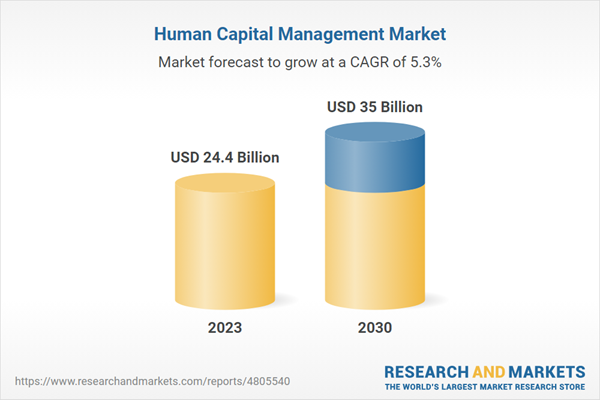Human Capital Management Strategic Business Report 2024-2030: Increasing Focus on Diversity, Equity, and Inclusion (DEI) Initiatives Expands Opportunities


Human Capital Management Market

Dublin, Oct. 09, 2024 (GLOBE NEWSWIRE) -- The "Human Capital Management - Global Strategic Business Report" report has been added to ResearchAndMarkets.com's offering.
The global market for Human Capital Management was estimated at US$24.4 Billion in 2023 and is projected to reach US$35.0 Billion by 2030, growing at a CAGR of 5.3% from 2023 to 2030. This comprehensive report provides an in-depth analysis of market trends, drivers, and forecasts, helping you make informed business decisions.

Human capital management (HCM) has emerged as a critical factor in modern businesses, but why is it so essential for optimizing workforce efficiency and driving organizational success? Human capital management refers to the comprehensive process of recruiting, managing, developing, and optimizing employees to maximize their contribution to an organization. HCM involves various activities, including talent acquisition, payroll, performance management, learning and development, and workforce planning.
What Factors Are Driving the Growth of the Human Capital Management Market?
Several factors are driving the rapid growth of the HCM market, including the increasing complexity of workforce management, the rise of remote and hybrid work models, and the growing importance of employee engagement and development. One of the primary drivers is the need for organizations to manage a diverse, global workforce more effectively. As companies expand internationally and employ workers across multiple locations, they require robust HCM solutions to manage everything from recruitment and payroll to performance management and compliance across different regions.
The rise of remote and hybrid work models has also fueled the growth of the HCM market. The COVID-19 pandemic accelerated the adoption of remote work, and many organizations are now embracing flexible work arrangements as a permanent feature. HCM systems enable companies to manage remote teams more efficiently by providing tools for virtual onboarding, performance tracking, and collaboration. These platforms also help ensure that remote employees remain engaged, productive, and connected to their teams, regardless of their location.
The growing importance of data-driven decision-making is another factor contributing to the growth of the HCM market. As businesses recognize the value of workforce analytics, they are investing in HCM platforms that provide real-time insights into employee performance, productivity, and engagement. These data-driven insights help HR leaders identify trends, address potential issues, and optimize workforce strategies. Predictive analytics in HCM also allow companies to forecast future workforce needs, helping them plan for growth, succession, and changing market conditions.
With the increasing complexity of workforce management, the rise of remote work, and the growing focus on employee engagement and data-driven decision-making, the HCM market is poised for continued growth. As organizations strive to optimize their workforce strategies and maintain a competitive edge, human capital management will remain a critical tool for achieving operational efficiency, driving innovation, and ensuring long-term success.
How Has Technology Advanced Human Capital Management?
Artificial intelligence (AI) and machine learning (ML) have revolutionized HCM by automating many administrative tasks and providing predictive analytics that help HR leaders make data-driven decisions. AI-powered recruitment tools, for example, can screen resumes, identify top candidates, and even conduct preliminary interviews, saving time and reducing human bias in the hiring process. AI is also used in performance management systems to analyze employee productivity, engagement, and development needs, helping managers offer more personalized support and targeted interventions.
Data analytics has become a cornerstone of modern HCM systems. Advanced analytics tools allow HR departments to track key metrics, such as employee turnover, engagement levels, training effectiveness, and compensation trends. By analyzing this data, organizations can identify patterns and potential issues early, enabling them to make proactive decisions to improve workforce performance. Predictive analytics, in particular, helps HR leaders forecast future workforce needs, plan for succession, and identify employees who may be at risk of leaving the organization. This data-driven approach helps companies optimize their workforce strategies and reduce the costs associated with high turnover and poor talent management.
Social collaboration tools have also been integrated into HCM platforms, facilitating better communication and teamwork. These tools enable employees to collaborate on projects, share feedback, and stay engaged with their teams, even when working remotely. In addition to improving productivity, social collaboration features foster a more connected and inclusive work environment, which can enhance employee satisfaction and retention.
Why Is Human Capital Management Critical for Organizational Success and Workforce Optimization?
HCM also plays a crucial role in improving employee engagement and satisfaction. Research shows that engaged employees are more productive, have higher job satisfaction, and are less likely to leave their jobs. HCM systems allow companies to track employee performance, gather feedback, and identify areas where employees may need support or recognition. Performance management tools help managers set clear goals, provide regular feedback, and identify opportunities for growth and development. This focus on continuous improvement not only boosts employee morale but also contributes to a culture of learning and innovation within the organization.
Compliance with labor laws and regulations is another area where HCM is essential. Employment laws and regulations are complex and constantly evolving, and non-compliance can result in costly fines and legal issues. HCM systems help organizations stay compliant by automating payroll, tax filings, and benefits administration. They also track employee records and ensure that companies are adhering to all applicable labor laws regarding overtime, leave policies, and workplace safety. This reduces the risk of non-compliance and helps organizations avoid legal issues that could damage their reputation and bottom line.
Key Insights:
Market Growth: Understand the significant growth trajectory of the Core HR Component segment, which is expected to reach US$13.2 Billion by 2030 with a CAGR of a 6.0%. The Integration & Implementation Component segment is also set to grow at 5.3% CAGR over the analysis period.
Regional Analysis: Gain insights into the U.S. market, which was valued at $6.5 Billion in 2023, and China, forecasted to grow at an impressive 9.3% CAGR to reach $8.3 Billion by 2030. Discover growth trends in other key regions, including Japan, Canada, Germany, and the Asia-Pacific.
Report Features:
Comprehensive Market Data: Independent analysis of annual sales and market forecasts in US$ Million from 2023 to 2030.
In-Depth Regional Analysis: Detailed insights into key markets, including the U.S., China, Japan, Canada, Europe, Asia-Pacific, Latin America, Middle East, and Africa.
Company Profiles: Coverage of major players such as 3Core Systems, 937 Payroll, Abanel Management Consulting Pvt. Ltd., and more.
Complimentary Updates: Receive free report updates for one year to keep you informed of the latest market developments.
Key Attributes:
Report Attribute | Details |
No. of Pages | 219 |
Forecast Period | 2023 - 2030 |
Estimated Market Value (USD) in 2023 | $24.4 Billion |
Forecasted Market Value (USD) by 2030 | $35 Billion |
Compound Annual Growth Rate | 5.3% |
Regions Covered | Global |
Key Topics Covered:
MARKET OVERVIEW
Influencer Market Insights
World Market Trajectories
Global Economic Update
Human Capital Management - Global Key Competitors Percentage Market Share in 2024 (E)
Competitive Market Presence - Strong/Active/Niche/Trivial for Players Worldwide in 2024 (E)
MARKET TRENDS & DRIVERS
Rising Demand for Workforce Optimization and Talent Management Drives Growth in Human Capital Management Market
Technological Advancements in Artificial Intelligence (AI) and Machine Learning Propel Innovation in HCM Solutions
Growth in Remote Work and Workforce Flexibility Expands Addressable Market for HCM Systems
Role of HCM in Enhancing Employee Experience and Engagement Strengthens Business Case for Adoption
Growth in Use of HCM for Performance Management and Succession Planning Expands Market Opportunities
Technological Integration for Seamless Payroll, Benefits, and Time Tracking Expands Market Potential
Increasing Focus on Diversity, Equity, and Inclusion (DEI) Initiatives Expands Addressable Market
Increasing Focus on Employee Wellbeing and Mental Health Expands Consumer Adoption of HCM Solutions
FOCUS ON SELECT PLAYERS(Total 133 Featured)
3Core Systems
937 Payroll
Abanel Management Consulting Pvt. Ltd.
ADAM Human Capital Management
ADP Italia
ADP, Inc.
Adrenalin eSystems
Advanced Payroll Solutions
AgileOne
Alcuin
For more information about this report visit https://www.researchandmarkets.com/r/gpflwq
About ResearchAndMarkets.com
ResearchAndMarkets.com is the world's leading source for international market research reports and market data. We provide you with the latest data on international and regional markets, key industries, the top companies, new products and the latest trends.
Attachment
CONTACT: CONTACT: ResearchAndMarkets.com Laura Wood,Senior Press Manager press@researchandmarkets.com For E.S.T Office Hours Call 1-917-300-0470 For U.S./ CAN Toll Free Call 1-800-526-8630 For GMT Office Hours Call +353-1-416-8900